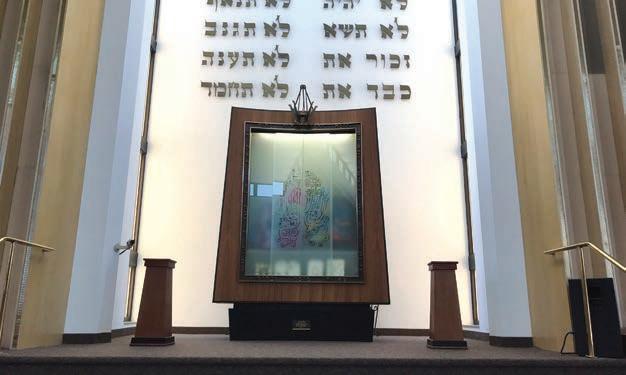
3 minute read
Torah portion
SPIRIT
TORAH PORTION
Advertisement
Take A Fresh Look
Acouple of years ago, I had an encounter at my favorite grocery store in Royal Oak that I still think about today. I was in the produce section when I happened upon a group of elementary school students, probably in fourth or fifth grade, with two teachers who were talking to them about fruits and vegetables.
I was immediately intrigued. I wondered if it was maybe a lesson about math and budgeting or maybe an economics class and the concept of supply and demand. But no; as one of the teachers spoke, picking up different items throughout her teaching, it was clear that this was a lesson about food. Where it comes from, how it gets to our stores and why it’s important for us to understand that journey.
I was entranced. Because even though, intellectually, I already knew everything this teacher was saying, I realized that these truths (local fruits and vegetables compared to imports, foods that are in and out of season, butchering, processing, etc.) rarely cross my mind when I’m at the store with a list in my hands and usually a selfimposed edict to be in and out as quickly as possible.
We take food for granted. At least the average American does. Many of us are so dramatically disconnected from the journey of our food from its beginnings to its final place on our tables and in our stomachs.
But it’s not too late for us to change that relationship. As parashat Behar/
Bechukotei shows us, our ancestors in the midbar were pretty clueless as well. I mean, after all, they had been enslaved for 400 years. But God knew that it was eventually going to be imperative for the
Israelites to have a sense of autonomy when it came to provide for themselves and their families and for interacting with a land that they could call their own.
The Promised Land wasn’t meant to be a utopia of leisure; it was to be the dream of rewards through labor, the pleasure of a relationship with creation in all of its splendor. The flow of milk and honey was a beautiful concept because it meant that the sweetness of nature came about through the hands of those who endeavored to learn it, know it intimately and appreciate it.
And so Jubilee, shmitah (resting the farmland every seventh year) and tithing are not arbitrary concepts. They are pathways to understanding. They are the lesson in the grocery store. We would do well to take a step back, let go of what we think we know and start again with new eyes that focus on gratitude and wonder.
Rabbi Yoni Dahlen Parshat Behar/ Bechukotei: Leviticus 25:1-27:34; Jeremiah 16:19-17:14.
Rabbi Yonatan Dahlen is a rabbi at Congregation Shaarey Zedek in Southfield.
This home belongs to we.belongs to we.

Find a mortgage solution that works for Find a mortgage solution that works for you because we believe communities thrive we believe communities thrive through the power of homeownership. through the power of homeownership.
Learn more at TCFBank.com/WelcomeHome TCFBank.com/WelcomeHome
All loans subject to credit approval and program guidelines. All loans subject to credit approval and program guidelines. ©2021 TCF National Bank. Member FDIC ©2021 TCF National Bank. Member FDIC
























